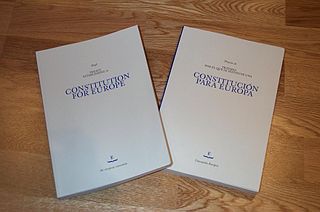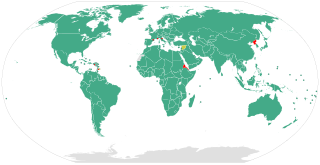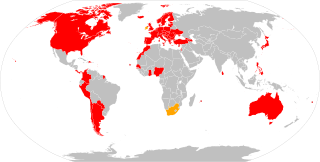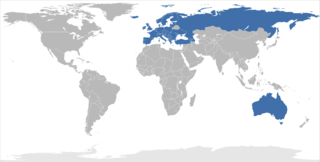
The Treaty establishing a Constitution for Europe was an unratified international treaty intended to create a consolidated constitution for the European Union (EU). It would have replaced the existing European Union treaties with a single text, given legal force to the Charter of Fundamental Rights, and expanded qualified majority voting into policy areas which had previously been decided by unanimity among member states.

Eurojust is an agency of the European Union (EU) dealing with judicial co-operation in criminal matters among agencies of the member states. It is seated in The Hague, Netherlands. Established in 2002, it was created to improve handling of serious cross-border and organised crime by stimulating investigative and prosecutorial co-ordination.

The United Nations Convention Against Corruption (UNCAC) is the only legally binding international anti-corruption multilateral treaty. Negotiated by member states of the United Nations (UN) it has been adopted by the UN General Assembly in October 2003 and entered into force in December 2005. The treaty recognises the importance of both preventive and punitive measures, addresses the cross-border nature of corruption with provisions on international cooperation and on the return of the proceeds of corruption. The UN Office on Drugs and Crime (UNODC) in Vienna serves as Secretariat for the UNCAC. UNCAC's goal is to reduce various types of corruption that can occur across country borders, such as trading in influence and abuse of power, as well as corruption in the private sector, such as embezzlement and money laundering. Another goal of the UNCAC is to strengthen international law enforcement and judicial cooperation between countries by providing effective legal mechanisms for international asset recovery.

A mutual legal assistance treaty (MLAT) is an agreement between two or more countries for the purpose of gathering and exchanging information in an effort to enforce public or criminal laws. A mutual legal assistance request is commonly used to formally interrogate a suspect in a criminal case, when the suspect resides in a foreign country.
The European Arrest Warrant (EAW) is an arrest warrant valid throughout all member states of the European Union (EU). Once issued, it requires another member state to arrest and transfer a criminal suspect or sentenced person to the issuing state so that the person can be put on trial or complete a detention period.

The Convention on the Service Abroad of Judicial and Extrajudicial Documents in Civil or Commercial Matters, more commonly called the Hague Service Convention, is a multilateral treaty that was adopted in The Hague, The Netherlands, on 15 November 1965 by member states of the Hague Conference on Private International Law. It came into existence to give litigants a reliable and efficient means of serving the documents on parties living, operating or based in another country. The provisions of the convention apply to service of process in civil and commercial matters but not criminal matters. Also, Article 1 states that the Convention shall not apply if the address of the person to be served with the document is not known.
Letters rogatory or letters of request are a formal request from a court to a foreign court for some type of judicial assistance. The most common remedies sought by letters rogatory are service of process and taking of evidence.

The Convention on the Taking of Evidence Abroad in Civil or Commercial Matters—more commonly referred to as the Hague Evidence Convention—is a multilateral treaty which was drafted under the auspices of the Hague Conference on Private International Law (HCPIL). The treaty was negotiated in 1967 and 1968 and signed in The Hague on 18 March 1970. It entered into force in 1972. It allows transmission of letters of request from one signatory state to another signatory state without recourse to consular and diplomatic channels. Inside the US, obtaining evidence under the Evidence Convention can be compared to comity.

The Service Regulation, officially the Council Regulation (EC) No. 1393/2007 on the service in the Member States of judicial and extrajudicial documents in civil or commercial matters, is a European Union regulation in the field of judicial cooperation. It allows service of judicial documents from one member state to another without recourse to consular and diplomatic channels.

Human rights are largely respected in Switzerland, one of Europe's oldest democracies. Switzerland is often at or near the top in international rankings of civil liberties and political rights observance. Switzerland places human rights at the core of the nation's value system, as represented in its Federal Constitution. As described in its FDFA's Foreign Policy Strategy 2016-2019, the promotion of peace, mutual respect, equality and non-discrimination are central to the country's foreign relations.

The United States is not a State Party to the Rome Statute of the International Criminal Court, which founded the International Criminal Court (ICC) in 2002 as a permanent international criminal court to "bring to justice the perpetrators of the worst crimes known to humankind – war crimes, crimes against humanity, and genocide", when national courts are unable or unwilling to do so.

The United Nations is developing an alternative treaty on cybercrime.
Transnational crimes are crimes that have actual or potential effect across national borders and crimes that are intrastate but offend fundamental values of the international community. The term is commonly used in the law enforcement and academic communities. Transnational organized crime (TOC) refers specifically to transnational crime carried out by crime organizations.

In the European Union (EU), enhanced cooperation is a procedure where a minimum of nine EU member states are allowed to establish advanced integration or cooperation in an area within EU structures but without the other members being involved. As of October 2017, this procedure is being used in the fields of the Schengen acquis, divorce law, patents, property regimes of international couples, and European Public Prosecutor and is approved for the field of a financial transaction tax.

International asset recovery is any effort by governments to repatriate the proceeds of corruption hidden in foreign jurisdictions. Such assets may include monies in bank accounts, real estate, vehicles, arts and artifacts, and precious metals. As defined under the United Nations Convention against Corruption, asset recovery refers to recovering the proceeds of corruption, rather than broader terms such as asset confiscation or asset forfeiture which refer to recovering the proceeds or instrumentalities of crime in general.
A European Investigation Order (EIO) is a mechanism established under EU law by which a judge or magistrate in one EU member state can make a binding request to the law enforcement agencies of another member state to collect evidence to assist in a criminal investigation. The order may authorise such actions as searches, wiretapping, surveillance, the subpoena of documents or records, etc. The mechanism exists throughout the EU, with the exception of Denmark and Ireland, who have opt-outs in this area of EU law. The EIO was established by Directive 2014/41/EU of the European Parliament and of the Council of 3 April 2014 regarding the European Investigation Order in criminal matters.
The European Convention on Information on Foreign Law is a 1968 Council of Europe treaty whereby states agree to procedures for the mandatory provision of information when a state requests information on the legal system of another state.

The Treaties of the European Union are a set of international treaties between the European Union (EU) member states which sets out the EU's constitutional basis. They establish the various EU institutions together with their remit, procedures and objectives. The EU can only act within the competences granted to it through these treaties and amendment to the treaties requires the agreement and ratification of every single signatory.

The Council of Europe Convention on Laundering, Search, Seizure and Confiscation of the Proceeds from Crime and on the Financing of Terrorism, also known as the Warsaw Convention or CETS 198, is a Council of Europe convention which aims to facilitate international co-operation and mutual assistance in investigating crime and tracking down, seizing and confiscating the proceeds thereof.

The Convention on Laundering, Search, Seizure and Confiscation of the Proceeds from Crime, also known as the Strasbourg Convention or CETS 141, is a Council of Europe convention which aims to facilitate international co-operation and mutual assistance in investigating crime and tracking down, seizing and confiscating the proceeds thereof. The Convention is intended to assist States in attaining a similar degree of efficiency even in the absence of full legislative harmony.